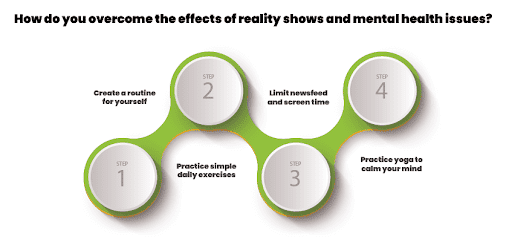Introduction
The reality show phenomenon started in the 1940s with shows like Ice Road Truckers, and This is Your Life. The participants in these shows are well-known celebrities or ordinary people, filmed in front of a live audience or in specific locations. This genre of T.V. shows became popular in the 1990s and early 2000s when many reality T.V. shows emerged. However, with time, they may be causing more harm to our mental health than good. This article discusses the effects of reality T.V. shows on our mental health.
Our Wellness Programs
What is a reality show?
A reality T.V. show aims to showcase how real people tend to behave in different situations, environments, and challenges created by the programme-makers that mimic everyday life. The programme films celebrities or members of the general public while they go about their daily lives and fulfil the tasks created by the programme-makers. The genre includes unscripted drama, real dating scenarios, talent shows, and competitions.
Looking for services related to this subject? Get in touch with these experts today!!
Experts

Banani Das Dhar

India
Wellness Expert
Experience: 7 years

Devika Gupta

India
Wellness Expert
Experience: 4 years

Trupti Rakesh valotia

India
Wellness Expert
Experience: 3 years
What is the relationship between a reality show and viewers’ mental health?
The relationship between a reality show and viewers’ mental health is a cause of concern since people who watch binge-watch reality shows are known to get aggressive and argumentative. Most reality shows that air today focus on the lives of celebrities and the super-rich. The content mainly revolves around possessions larger than life and perfect body images that may seem impossible for a viewer to attain. The lack of body diversity in the shows creates a sense of shame in the viewers, leading to mental health problems.
How are reality shows and mental health related to each other?
- While you think you enjoy watching your favourite people live extraordinary lives, you may inadvertently draw comparisons with yourself and how you live your life.
- There is a superficial sense of connection to these reality T.V. stars. You may think that you don’t measure up to their standards, physical appearance, financial independence, luxuries, and the most notable element – fashion.
- Watching reality T.V. can create a sense of shame and distress when you compare.
- You may despise your look, lifestyle, and fashion sense. It is detrimental to body positivity and good spirit. It causes emotional stress.
- Stress can lead to mental health issues such as depression, anxiety, and personality disorders.
- Stress also leads to many physical problems, from minor headaches to more severe problems, including cardiovascular diseases.

What are the effects of Reality T.V. on mental health?
Reality T.V. shows affect viewers mentally.
- They may stop appreciating their life and want bigger homes, designer clothes, and fancy cars.
- They may want to be able to host lavish parties just like in the shows that they watch so diligently. The lack of these luxuries in their lives may lead to self-involved, aggressive behaviour, arrogance, and frustration.
- The Real Housewives franchise participants behave aggressively, gossip, and deceive each other. There are bountiful episodes of catfights.
- Young viewers tend to imbibe this behaviour and get aggressive. They forget to be kind and compassionate towards their friends and family.
- Young audiences may think it might be okay to be rude and disrespectful towards others after watching reality T.V. shows of this nature.
- It subsequently leads to arguments within families. Further, children who watch reality T.V. shows and their parents get influenced by the performances and may become irritable and bad-tempered.
How does depression get involved with reality shows and mental health?
- Reality T.V. can set off anxiety and depression regarding body image and financial status.
- Watching the perfect silhouettes of the likes of members of the Kardashian-Jenner families and the participants of The Bachelor can create a benchmark for body image in the viewers’ minds.
- If their bodies do not measure up to this standard, it causes low-self esteem and frustration. It can lead to thoughts of self-hate and self-harm.
- The lack of glamour and glitz in the lives of ordinary people, the realisation that they may never be able to afford big homes and the lavish lifestyle shown in these programmes may lead to diminished self-worth in viewers.
- It affects their overall outlook on life and causes mental distress. They end up being dissatisfied with their accomplishments and less appreciative of the life that they are living. Over time, this can generate depressive behaviours among the viewers.
How do you overcome the effects of reality shows and mental health issues?
Watching reality T.V. shows can cause emotional stress. You can incorporate specific changes in your everyday schedule to overcome the mental health problems that come with watching reality shows:
- Create a routine for yourself
- Practice simple daily exercises
- Limit newsfeed and screen time
- Eat well
- Take a walk to the park to take your mind off the things bothering you from the show.
- Practice yoga to calm your mind
- Practice relaxation techniques such as meditation and breathing exercises
- Enrol in a career development program or a short course that would benefit your career path and business.
- Do not stress over something you have watched on T.V., as the emotional stress it causes may affect your mental health and general wellbeing.
- Have a body-positive mindset, and do not let reality T.V. shows hamper your spirit.
Conclusion
Reality T.V. is a popular television genre. People binge-watch most reality T.V. shows as they may appear to be a lot of fun. There are downsides to watching a reality show, and mental health problems arise, which may affect you in many ways. At the same time, it may not be possible to avoid altogether watching reality T.V. shows. It is important to remember that they are created for entertainment only. Try and limit the content that you consume every day.
Make a conscious effort not to compare yourself with your favourite reality T.V. stars. To promote your mental health, create a routine for yourself, eat well, practice exercises, go for a brisk walk, and talk to your friends and family. You may also turn the situation around by motivating yourself to advance in your career or business. You can also contact the trained mental health professionals at United We Care to help you de-stress your mind and help you lead the best version of your life.
| [1] | L. Gregg and N. Tarrier, “Virtual reality in mental health : r. Epidemiol., vol. 42, no. 5, pp. 343–354, 2007. |
| [2] | H. S. Peek and E. Beresin, “Reality check: How reality television can affect youth,” Acad. Psychiatry, vol. 40, no. 1, pp. 177–181, 2016. |
| [3] | L. R. Valmaggia, L. Latif, M. J. Kempton, and M. Rus-Calafell, “Virtual reality in the psychological treatment ce,” Psychiatry Res., vol. 236, pp. 189–195, 2016. |










